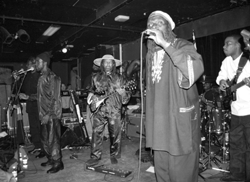Reggae
Legends Bring Good Vibes, Wise Words
by John MacDonald
 Oberlin
students woke up Monday to a bitterly cold morning, but those folks
who made it to the Culture show that night at the ’Sco got
enough warmth and energy to last them until next spring. Oberlin
students woke up Monday to a bitterly cold morning, but those folks
who made it to the Culture show that night at the ’Sco got
enough warmth and energy to last them until next spring.
Originating in Kingston, Jamaica, Culture, headed by legendary roots
reggae pioneer Joseph Hill, has produced over 24 albums throughout
their near quarter-century of existence. From their hugely influential
debut, 1977’s Two Sevens Clash, to their later releases Payday
and Humble African, the trio at the heart of Culture, Albert Walker,
Keneth “Paley” Dayes and Hill have produced a body of
work and a legacy to rival that of fellow reggae masters Bob Marley
and Peter Tosh.
Though Hill’s influences range from these pioneers, to Paul
Simon and even the Beatles, as Hill himself said, “I’m
more of a trend setter, not a copycat.” Culture’s passion
and precision onstage and all the loving fans who gave back every
bit of intensity he and his band gave justified his confidence.
Reggae’s vast history and the political struggles that are
woven so deeply within its culture can seem intimidating to those
who know no more then Marley’s “No Woman No Cry,”
but Culture’s performance had enough of a broad appeal to attract
everyone from the casual listener to the reggae scholar. As Hill
put it, “I’m not here to enjoy, I’m here to spread
joy,” and it was the way every song expressed this love for
the audience that made his music so powerful.
This “classique style” of roots reggae featured songs
from all over the group’s lengthy career: from the ganja anthem
“Legalization” off their latest disc Payday, to their
hit “Jah Pretty Face” from their ground-breaking debut.
Thematically, Hill and crew focused on familiar reggae themes —
Rastafarianism, social justice and, last but not least, the mighty
herb. “Legalization” featured the catchy hook, “Legalization!
Free the ganja herb,” which was followed by the equally potent
“International Herb” from the 1979 album of the same name.
One of the most moving tunes of the night was “Equal Rights,”
a song dedicated to Peter Tosh (“’nuff respect,”
as Hill put it) in which Hill discredited the need for peace without
first attaining equal rights and justice for all — an idea
that summed up the message behind Culture’s music.
These messages, though, wouldn’t have gone over quite so well
if Hill and company hadn’t displayed such sincerity and talent
onstage. Though Hill looked at least a decade or two older then
his mates, all his years of experience gave him an ease with his
music and the crowd that was irresistible. And the few times he
busted a move, the audience went nuts cheering him on. Walker and
Talford Nelson (who filled in for Dayes) were equally poised, setting
up a cool layer of vocal harmony under Hill’s chants and choruses.
To say Culture’s backing band, Forces of Justice, was tight
Monday night would be an understatement. Their confidence and pizzazz
onstage was matched only by the quality of songs they were performing.
As one keyboardist laid down the melodic rhythm, the other’s
synthesizer added a trumpet riff or a cascading organ melody on
top. The bassist and drummer also maintained an endearing musical
relationship onstage — smiling at each other whether they were
maintaining a steady beat or making a 90 degree turn. And the band
didn’t even miss a beat when Culture’s sound engineer
ran delay effects through certain tracks to give their music that
classic dub sound.
But the real standout was the guitarist. Decked out in blue silk,
dreds, and a conical straw hat, he exhibited exquisite taste in
both his rhythm playing and his solos. Though reggae often limits
its guitar players to a fairly minimal role, Culture’s guitarist,
when prompted, could tear up a solo as well as any Jimmy Page or
Kirk Hammet. This was especially true of their last song of the
main set, “Not Ashamed,” where a wicked major key guitar
riff led into at least two hair-raising and immensely crowd-pleasing
solos. These moments were so rock, with the spotlighted guitarist
standing in front of the monitors, his face sublimely twisted with
sweat pouring down and the audience’s arms raised at a 45 degree
angle toward their new hero, one almost thought they were front
row at a Van Halen concert rather then a roots reggae show.
That said, Culture’s performance was all about community and
the love of reggae music. Seeing everyone from out of town adults
to dred-locked Obies, jumping and jiving to the same melodic beat,
was a true pleasure and Hill’s positive message and wise-man
presence made the event all the more special. Taking the pulse of
his audience in between songs, Hill said, “I just feel like
this time, isn’t wasted time.” You could almost see the
entire crowd nod in unison.
|



